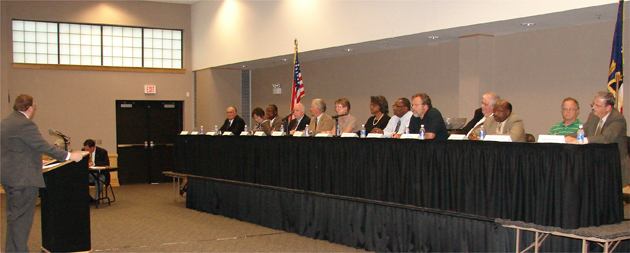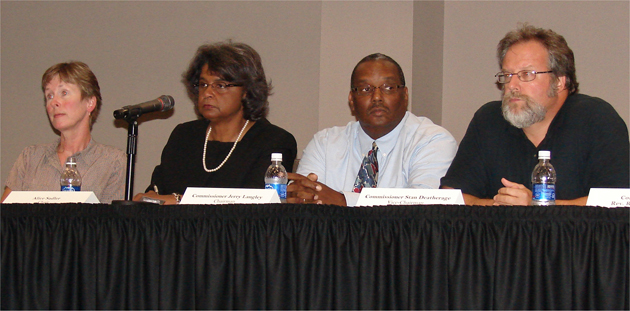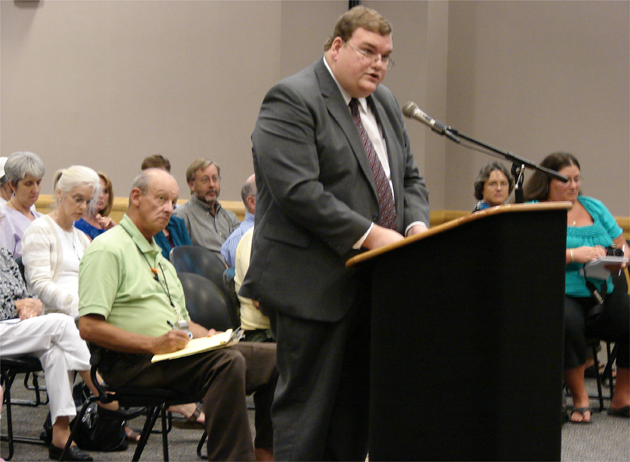Beaufort Regional Health System employees had the most well represented voice at last night’s state-mandated public hearing on the health system’s intention to lease or sell the local hospital to a foreign entity. Of the 17 who spoke at the hearing, 6 were hospital employees; with one employee claiming to represent all BRHS nurses, another claiming to represent all BRHS doctors, and another claiming to represent the entire Cardio-Pulmonary Unit at the hospital. The other three spoke as individuals.
All six BRHS employees who spoke were vehemently in favor of merging the small community hospital with another larger institution. At this point, it’s safe to conclude that, unless a dissenter is brave enough to speak out, it is now a matter of public record that all BRHS doctors and nurses, and all employees of the Cardio-Pulmonary Unit, are opposed to their current employer remaining independent.
 The dais of Beaufort County of Medical Center Board of Commissioners and the Beaufort County Board of County Commissioners: Above. A closeup of some of the group, from left to right - Dr. Brenda Peacock, Alice Mills - Sadler, County Commissioners Gerry Langley and Stan Deatherage: Below.
The dais of Beaufort County of Medical Center Board of Commissioners and the Beaufort County Board of County Commissioners: Above. A closeup of some of the group, from left to right - Dr. Brenda Peacock, Alice Mills - Sadler, County Commissioners Gerry Langley and Stan Deatherage: Below.

Mary Belcher, who said she was speaking on behalf of her fellow nurses, implored a panel of BRHS Authority Board Commissioners and Beaufort County Commissioners to pursue a merger specifically with University Health Systems of Eastern North Carolina, based at Pitt County Memorial Hospital in Greenville, on the basis that UHS is a not-for-profit institution, it has similar relationships with other rural hospitals in the region, and many of its physicians and services are already integrated into BRHS.
“We petition you to accept a bid from Pitt and to reject outright any plans to maintain independent or to align with for-profits,” said Belcher. “If the Pitt hospital bid should for some reason be unworkable, then we urge you to seek another not-for-profit.”
UHS is the only not-for-profit institution currently interested in a partnership with BRHS. Its 13 other suitors all do business on a for-profit basis. Belcher warned against aligning the hospital with a for-profit company:
“Nurses I have known well who have worked at for-profit hospitals, and many of them are here tonight, relate a definite decrease in RN staffing, minimal supplies and job dissatisfaction, compared to working at a not-for-profit.”
Her husband, Beaufort County Board of Education Chairman Robert Belcher, later echoed these same sentiments when it was his turn at the podium; but took them one step further. Reading calmly from his prepared manuscript, he publicly supported the same shady business practices that ex-BRHS Authority Board Chairman, Sandy Hardy, had previously denied: orchestrating an under-the-table deal between BRHS and UHS, just as the Request For Proposals packets were being mailed out to the 14 interested parties last June/July.
“I wish that you had chosen to simply have gone into negotiations with Pitt behind closed doors and found a way for the two entities to work out an affiliation,” said Robert Belcher. “I also hope that Pitt does not get cold feet and back away from submitting a proposal.”
Only since those who were trying to finagle that kind of ‘sweetheart deal’ with UHS have resigned, including Bill Bedsole, Sandy Hardy and Sandy Easley, has the BRHS Authority Board been able to make real strides in the search for a potential partner with which to merge and in improving the hospital’s financial situation: Hardy resigned as Chairman on July 14; the RFP’s were mailed out on July 21; the hospital board agreed to sell its real estate to Beaufort County on July 27; and the Cost Containment Committee has met four times to devise aggressive cost-cutting and money-making strategies.
Buzz Cayton, who introduced himself at the podium as a Beaufort County Medical Center patient, referred to this progress, and asked the panel to give the hospital time to see if it can remain independent under new management.
“We have certainly been following and seeing great improvements in management as this process has been going on,” said Cayton. “Now that we see these improvements happening, suddenly—certainly, if we give them a reasonable length of time, a lot of the problems we have can be corrected.”
Beaufort County commissioner Stan Deatherage, the only member of the panel who came down to the podium to speak, talked about the successes the county has had since its management began to cut waste. Civitas Institute recently ranked Beaufort County among the top five most efficient counties in the state. He challenged the BRHS Authority Board to do the same with the hospital, so that it could still have a chance to remain independent.
“As a Beaufort County commissioner, who has been a commissioner for going on 14 years, and has had the temerity to help the county manager manage, I’m asking you to help manage yourself out of this situation,” he said.
The desire for BRHS to remain independent is often seated in the same feelings that inspire others to push for a merger: fear. Those who wish to remain independent largely fear that bringing in a foreign entity will detract from the uniquely personal care provided by a community hospital. At the public hearing, John Murphy, of Washington, said he and his wife were so lucky to have had the team at BRHS to care for them after they were both diagnosed with cancer.
 Derek Davis adress his concerns to the commissioners and the public: Above.
Derek Davis adress his concerns to the commissioners and the public: Above.
“Only a community hospital, with a staff of our friends and neighbors can provide this kind of care. It would be a tragedy if our hospital was turned over to an outside entity who’s main concern was the return on their shareholders’ investments,” said Murphy. “Even a not-for-profit center such as UHS from Greenville couldn’t possibly provide the dedicated, high quality care that a locally managed and staffed facility such as ours has been able to consistently provide.”
Those who wish for the hospital to merge largely fear that BRHS will lose patients and employees to bigger hospitals; or even lose lives, due to the perceived limitations of a rural hospital.
“What happens if somebody has a major wreck, or an accident, and has to go to the emergency room and can not be treated at Beaufort County? Are they going to airvack them to Norfolk or further away?” asked Tomp Litchfield Jr. at the public hearing. “It’s a good possibility. Waiting for that aircraft to get to Washington, either getting here or getting back, somebody’s going to die. I would hate that to be on anybody’s conscience.”
At the end of the public hearing, BRHS Authority Board Chairwoman Alice Mills Sadler thanked the 250 or so people in attendance, including the speakers, and assured them that their participation would not be in vain.
“We have noted both on our pads and in our hearts all of your concerns and everything will be taken into consideration in our deliberation on what is best for the future of the hospital,” she said.
There will be a second state-mandated public hearing sometime within the next 30 days, where the public will have a chance to express their opinions on the future of the hospital, after all proposals from those institutions still interested in merging with BRHS have been received. The deadline for the proposals is Sept. 4.

 The dais of Beaufort County of Medical Center Board of Commissioners and the Beaufort County Board of County Commissioners: Above. A closeup of some of the group, from left to right - Dr. Brenda Peacock, Alice Mills - Sadler, County Commissioners Gerry Langley and Stan Deatherage: Below.
The dais of Beaufort County of Medical Center Board of Commissioners and the Beaufort County Board of County Commissioners: Above. A closeup of some of the group, from left to right - Dr. Brenda Peacock, Alice Mills - Sadler, County Commissioners Gerry Langley and Stan Deatherage: Below.

 Derek Davis adress his concerns to the commissioners and the public: Above.
Derek Davis adress his concerns to the commissioners and the public: Above.